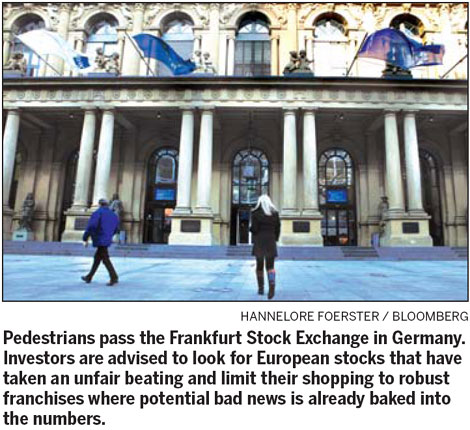Bargain bins for European equities open
Updated: 2012-02-06 07:57
By Chris Taylor (China Daily)
|
|||||||||||

NEW YORK - With the Standard & Poor's 500 Index off to its best January in 15 years, it's getting tougher to find cheap stocks in the United States. But it's not much of a problem in Europe.
Sovereign default worries have made the region's shares the cheapest they've been for US investors since 2004.
Companies in the S&P Europe 350 are trading at around 10 times earnings for 2012, compared with 12.2 for the S&P 500. That means investors are getting a 20 percent-plus discount for looking across the pond.
For good reason, of course. Investors are still nervous about the future for European equities because no one yet knows how the debt crisis is going to play out. On any given day, fresh rumors abound regarding the dismal outlook of nations such as Greece, Spain and Italy.
For speculators with nerves of steel, the point of maximum fear is when you can often make your most lucrative bets. And big, blue-chip European companies - the powerful multinationals that aren't going to disappear, no matter what happens to Portuguese bond yields - look to be on sale. With their US-listed American Depositary Receipts, buying shares is easy.
"There are a lot of European companies that look attractive right now," said Stan Pearson, head of European equities for Standard Life Investments. "Focus on world-class companies with geographic diversification and strong balance sheets. Then you won't even have to make a judgment about the euro because those companies will be able to weather whatever happens."
Some of Pearson's favorites: Danish drugmaker Novo Nordisk A/S, with its strong diabetes franchise, and Belgium's Anheuser-Busch InBev NV, the brewer behind Budweiser and Beck's. Both happen to be headquartered in Europe but are worldwide cash machines that aren't about to be felled by any sovereign debt troubles. For 2010 InBev threw off the equivalent of $7.5 billion in free cash flow, and Novo Nordisk $2.8 billion.
Sidestepping traps
As always with deep-value investing, you'll have to be prepared to sidestep falling knives. And, in Europe, the sky seems to be full of them. As a result, it's probably wise to stay away from European financials for the time being, which are particularly exposed to the region's economic woes. Utilities should also give you pause - they're highly regulated and tied to particular regions.
Instead, hunt for names with a healthy portion of their operations and profits overseas and that boast manageable debt, solid earnings and decent yield. That's the kind of profile that attracts Robert Quinn, chief European equity strategist for S&P Capital IQ. One top pick: Telecom goliath Vodafone Group PLC for its international breadth and reasonable forward price/earnings ratio of 10.2 paired with a juicy 5.4 percent yield. Among sectors, Quinn likes consumer staples, energy, insurance and telecoms but is shying away from consumer discretionary and diversified financials.
An added bonus of investing in Europe: The average yield on equities is much higher than in the US market - almost double, in fact. That should provide downside support and appeal to income-hungry baby boomers as well. France Telecom SA currently yields almost 13 percent, for instance, while oil giant Total SA offers 5.6 percent.
Good choices
If you're willing to take a risk on European stocks, this is what investors should keep in mind.
Look for stocks that have taken an unfair beating. Limit your shopping to robust franchises where potential bad news is already baked into the numbers. German industrial giant Siemens AG has tanked 35 percent from last spring - from $145 to less than $95 - making it low-hanging fruit for US investors, according to Joe Tatusko, chief investment officer of wealth managers at Westport Resources. It boasts low debt, lofty return-on-equity and nearly half of its sales are outside Europe.
Despite the currency ties, countries within Europe all have very different economic outlooks. Germany, for instance, is no Italy when it comes to its finances. As a result, stocks focused on Northern Europe will generally be less risky that those operating in the Mediterranean region.
Currency issues will play a role. If the euro is in for a rough ride, as many analysts predict, it could actually provide an earnings jolt for European megacaps. "By year-end we expect the euro to trade closer to $1.10," said Christopher Vecchio, a currency analyst for foreign-exchange site DailyFX. "A weaker currency is generally supportive of European multinationals because it lowers production costs and helps exports."
Saddle up for a bumpy ride. If you do buy into Europe, don't expect volatility to decrease anytime soon. Ratings agencies are on the warpath, with Fitch recently downgrading the debt of five eurozone countries including Spain, Italy and Belgium. Until visibility becomes clearer, it will take time for your bargain shopping to pay off.
"Go in with a two-year time horizon," said Standard Life's Pearson.
Reuters
Today's Top News
President Xi confident in recovery from quake
H7N9 update: 104 cases, 21 deaths
Telecom workers restore links
Coal mine blast kills 18 in Jilin
Intl scholarship puts China on the map
More bird flu patients discharged
Gold loses sheen, but still a safe bet
US 'turns blind eye to human rights'
Hot Topics
Lunar probe , China growth forecasts, Emission rules get tougher, China seen through 'colored lens', International board,
Editor's Picks

|

|

|

|

|

|





